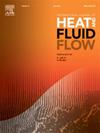The influence of heat transfer regime and jet parameter on film flow in jet impingement boiling
IF 2.6
3区 工程技术
Q2 ENGINEERING, MECHANICAL
International Journal of Heat and Fluid Flow
Pub Date : 2025-07-05
DOI:10.1016/j.ijheatfluidflow.2025.109948
引用次数: 0
Abstract
Liquid rocket engines utilize jet impingement on walls to form liquid films, which can undergo boiling when subjected to the effect of heat soak back. This study employs the Eulerian multiphase model coupled with the Rensselaer Polytechnic Institute (RPI) model to numerically investigate this phenomenon. The effects of heat transfer regime on liquid film are examined, as well as the effects of inclination angle, flow rate, and subcooling degree. Results show that liquid convection, nucleate boiling, and transition boiling are the dominant heat transfer regimes. The transition from liquid convection to nucleate boiling significantly influences the velocity and temperature profiles of the liquid film, both of which exhibit two-segment characteristics. The impact of boiling on the mass of liquid film is negligible. The inclination angle and flow velocity moderately affect the velocity decline rate and temperature rise rate. Increasing the flow rate may effectively eliminate the influence of heat soak back.
射流撞击沸腾过程中传热形式和射流参数对膜流动的影响
液体火箭发动机利用射流对壁面的撞击形成液体膜,液体膜在热浸回的作用下发生沸腾。本研究采用欧拉多相模型结合伦斯勒理工学院(RPI)模型对这一现象进行数值研究。考察了传热方式对液膜的影响,以及倾角、流量和过冷度的影响。结果表明,液体对流、核沸腾和过渡沸腾是主要的传热形式。从液体对流到成核沸腾的转变对液膜的速度和温度分布有显著影响,两者都表现出两段特征。沸腾对液膜质量的影响可以忽略不计。倾角和流速对速度递减率和温升率影响较小。增大流量可有效消除热浸回流的影响。
本文章由计算机程序翻译,如有差异,请以英文原文为准。
求助全文
约1分钟内获得全文
求助全文
来源期刊

International Journal of Heat and Fluid Flow
工程技术-工程:机械
CiteScore
5.00
自引率
7.70%
发文量
131
审稿时长
33 days
期刊介绍:
The International Journal of Heat and Fluid Flow welcomes high-quality original contributions on experimental, computational, and physical aspects of convective heat transfer and fluid dynamics relevant to engineering or the environment, including multiphase and microscale flows.
Papers reporting the application of these disciplines to design and development, with emphasis on new technological fields, are also welcomed. Some of these new fields include microscale electronic and mechanical systems; medical and biological systems; and thermal and flow control in both the internal and external environment.
 求助内容:
求助内容: 应助结果提醒方式:
应助结果提醒方式:


